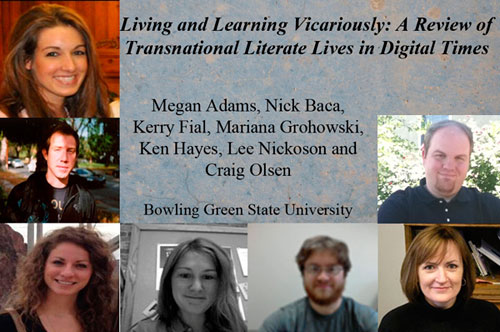
Berry, Patrick W., Hawisher, Gail E., & Selfe, Cynthia L. (2012). Transnational Literate Lives in Digital Times. Logan, UT: Computers and Composition Digital Press/Utah State University Press. Retrieved from http://ccdigitalpress.org/transnational
We came to Transnational Literate Lives in Digital Times (TLL), Patrick W. Berry, Gail E. Hawisher, and Cynthia L. Selfe’s 2012 book-length collection of digital literacy narratives, from three different vantage points: as doctoral students in a writing research methods seminar, an undergraduate student enrolled in a composition pedagogy class, and, finally, as the professor of record for both classes. Each of us read TLL to learn more about individual histories with technology and also about the collaborative methods for locating, gathering, and presenting the digital narrative content of TLL. TLL did not disappoint: Berry, Hawisher, and Selfe provide a dynamic and purposefully multi-vocal discussion of digital literacy practices as told by a collection of inter- and transnational undergraduate and graduate students to “suggest different and increasingly accurate ways of understanding the life histories and digital literacies of those with transnational connections, attempting to take into account local perspectives and the complex processes of globalization” (“About” para. 1).
Berry, Hawisher, and Selfe deploy a collaborative, multimodal approach to storytelling to highlight affordances digital media bring to research as a way of presenting a more comprehensive account of participant experience than exclusively alphabetic text allows. Embedded video clips allow readers to see and hear Mirza Nurkic describe his family’s 1988 move from the former Yugoslavia to Australia (Chapt. 2). Readers watch the video Ismael Gonzalez’s narrative “Writing: Pain or joy,” (Chapt. 4), and so on. Those who have been traditionally considered to be “research participants” function as coauthors, as fellow storytellers in TLL. An additional break from tradition, Berry, Hawisher, and Selfe also provide direct and reflexive attention to methods and methodology, making the text a must-read not only for new(er) digital literacy researchers, but for any researcher looking to develop expertise in reading and conducting person-based, digital, feminist, and/or collaborative writing research.